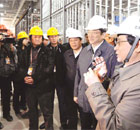Energy
Sinopec refines 20% more oil to fuel China's economy
(Agencies)
Updated: 2010-04-29 14:42
 |
Large Medium Small |
China Petroleum & Chemical Corp refined 20 percent more crude oil in the first quarter compared with a year earlier to meet higher fuel demand from car owners and factories in the world's fastest-growing major economy.
Sinopec, as Asia's biggest refiner is known, processed 49.5 million metric tons of crude into oil products, the Beijing-based company said yesterday as it reported a 40 percent jump in profit for the first three months.
"The rapid Chinese economic recovery will continue to provide strong support to the consumption of oil products this year, and Sinopec undoubtedly will be the biggest beneficiary compared with its global peers," said Wang Aochao, head of China energy research at UOB-Kay Hian Ltd in Shanghai.
China will account for almost a third of global oil demand growth this year, according to the International Energy Agency, offsetting stagnant consumption in developed economies, particularly Europe. That's why Shell and BP are considering investing in new refineries and petrochemical plants in China.
Sinopec has advanced 8.3 percent in Hong Kong trading in the past year compared with the 40 percent gain in the Hang Seng Index. The shares rose 0.2 percent to HK$6.28 at 11:21 am local time.
Surging economy
The Chinese economy grew 11.9 percent in the first quarter, the fastest pace in almost three years. Sinopec's fuel sales surged 24 percent to 32.8 million tons during the period.
China may process a record volume of crude oil this month, bolstered by an economic recovery, an increase in pump prices, and fuel stockpiling before the Shanghai World Expo in May, the government-backed China Petroleum & Chemical Industry Association said on April 21.
Fuel prices
China sets fuel prices to curb inflation. More than a year ago, the government relaxed pricing controls as part of economic reforms, prompting new investments in the refining industry. Gasoline and diesel prices were last raised by as much as 4.6 percent on April 14.
The government has adjusted prices 10 times since introducing a mechanism in December 2008 that allows China to revise prices when crude-oil costs change more than 4 percent over 22 working days. Oil in New York has more than doubled from last year's low in February to $82 a barrel.
"The latest fuel price hike despite inflationary pressures persuades the market to believe that the government will stick to the revised pricing mechanism," said Grace Liu, an oil analyst at Guotai Junan Securities Co. "And that will ensure a profit margin for Sinopec's refining business this year when oil prices are forecast to be around $80 a barrel."
Sinopec will urge the government to raise fuel prices when the conditions for an adjustment are met, Chief Financial Officer Wang Xinhua told reporters on a conference call today.
Overseas expansion
It's hard to estimate how much profit Sinopec would make from refining in the second quarter, as changes in the global crude oil market and the pace of China's fuel price adjustments remain uncertain, Wang said. "Sinopec still faces pressure in its refining operations," he said.
To meet rising domestic demand, Chinese energy companies led by PetroChina Co are acquiring assets overseas. Sinopec plans to raise funds by selling 20 billion yuan of bonds next month in Shanghai, spokesman Huang Wensheng said yesterday. The bond sale plan was approved at the annual general meeting last year, Huang said.
Sinopec is studying how to develop its refining and petrochemical business overseas including Singapore, Wang said. The company is "actively preparing" to build a lubricant oil base in the city-state, he said.













